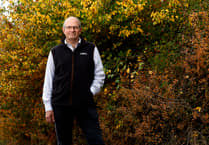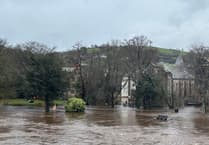A new police sergeant in charge of Ivybridge and a swathe of the South Hams is calling on his 33 years’ experience to serve the area as best he can amid tough times.
Andy Woodward took over as neighbourhood sergeant for Ivybridge Town, Ivybridge Rural North and Ivybridge Rural South last month. As such he is responsible for a huge area of town and country, from Mothecombe to Heybrook Bay on the coast, around the eastern and northern fringes of Plympton and Plymouth as far as Lopwell Dam on the River Tavy, to rural communities like Wotter, Cornwood and Shaugh Prior as well as Ivybridge itself.
The new sergeant is 51, and plans to finish his career in Ivybridge. He is married with a six-and-a-half-year-old daughter and keeps himself busy when not working with sports, cross fit, running, cycling and anything outdoors, particularly birdwatching.
Sgnt Woodward joined the force in 1984, and has spells in Plymouth, Kingsbridge and Ivybridge with neighbourhood and response teams in his lengthy CV, as well as time in major incident support with the CID. His previous role was as a response sergeant based in Kingsbridge.
He said: "I’ll retire in post, all being well and good, so I plan to be here for three to four years. In that time I’ll be working on forging good relationships with the town council and all the other partner agencies neighbourhood police need to work with.
"It’s a completely different beast to response policing, more problem solving and preventative work. In response you’re dealing with a crisis, but in neighbourhood policing you’re coming in behind, perhaps trying to resolve longer standing issues.
"There’s a lot of work around vulnerable people, dealing with mental health issues, social care, young children and elderly people, who might fall victim to internet and telephone scams, for example. Dealing with that is more and more around safeguarding and working with partner agencies to prevent people being victims.
"A lot of scams are done from overseas and require work by specialist IT units to solve, but they are really impactive on victims financially. When people are under great financial stress it can lead to tragic consequences, and also people don’t want to admit falling victim. They might be embarrassed or ashamed, and it can mean they don’t want to contact the police.
"I suspect there are a lot more of these than get reported."
Sgnt Woodward was keen to stress that while Ivybridge no longer has an enquiry office, the station does have 24/7 cover. To look after his large and diverse area, Sgnt Woodward relies on a relatively small team of neighbourhood beat managers and police community support officers.
PC Martin Perry oversees Ivybridge Town neighbourhood with help from PCSOs Diane Summers and Jude Serpell, PC Tamsyn Dingley manages the rural north neighbourhood, and PC Charlotte Mathers Ivybridge Rural South along with PCSO Andy Potter.
In reality, Sgnt Woodward said, any member of the team can be called upon to deal with issues across the area. He continued: "My neighbourhood beat managers are also called upon to provide added response resilience, when response officers here get dragged into Plymouth or Torbay, for example.
"They have to be real jack of all trades. But that’s the way policing is going these days, and its becoming increasingly difficult with the lack of resources.
"As an example of what I mean by that, when I first came to Plymouth in 1986, I’d come in at 2pm and there would be three sections on duty. So you could have 60 uniformed officers at Charles Cross alone, not to mention Crownhill, Devonport and the other stations.
"Fast forward to today, and the numbers are significantly reduced. But having said that, crime has changed, there’s a lot more over the internet and property crime has reduced. We need to meet that head on.
"Demands on the police from things like social care and mental health issues are also significant. It’s not just the police though, it’s the same for the ambulance service for example, who are increasingly being taken away from medical issues to deal with social care.
"I think for people in rural areas, connecting with the police can be a concern. But I would stress, if you are concerned, if you have a hunch about something or somebody, just call 999, or 101 if it’s not an emergency.
"I think some people don’t because they’re worried they’ll waste police time. But I’d rather go out and find a call has been made in good faith, than find out later something happened and that call was never made.
"The police are an emergency service, whether it’s nine in the morning or the middle of the night."





Comments
This article has no comments yet. Be the first to leave a comment.